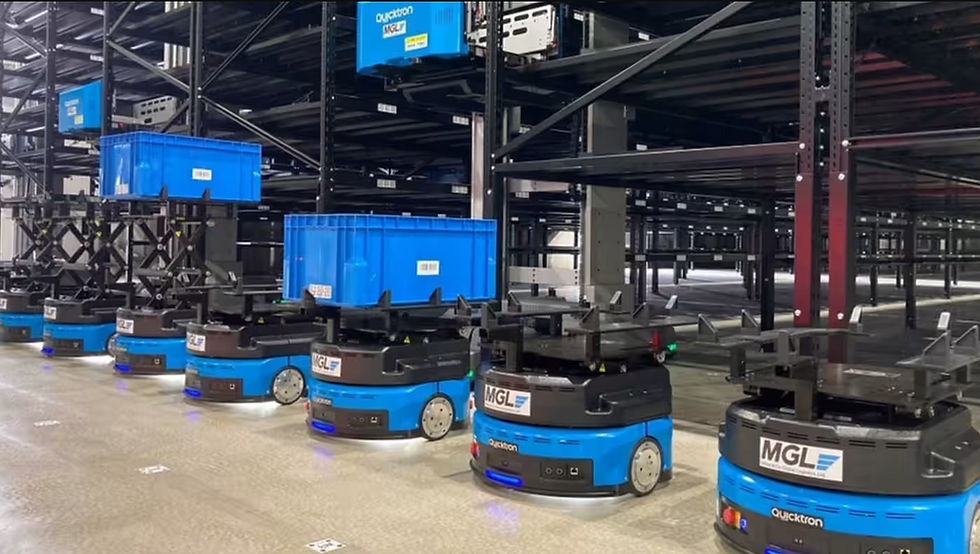China's Warehouse Robots to Alleviate Japan's Logistics Crisis
Chinese warehouse robot startups are targeting the Japanese market to address the logistics industry's impending bottleneck. Syrius Robotics plans to deliver 3,000 robots annually to Japan within two years. Major e-commerce firms in Japan have already implemented warehouse robots.
Chinese warehouse robot startups are eyeing the Japanese market as it grapples with a looming bottleneck in the logistics industry. Syrius Robotics, based in Shenzhen, plans to deliver 3,000 robots annually to Japan within two years, a tenfold increase from the current volume. These robots, which mimic human parcel pickers, efficiently sort and move products for shipping.
Adam Jiang, CEO of Syrius Robotics, founded the company in 2018 after working as an engineer at Google and Nvidia. The robots developed by Syrius can navigate narrow aisles, making them suitable for any warehouse with minimal modifications.
Last summer, a logistics center on Japan's Shikoku island introduced 60 Syrius robots, resulting in a reduction of staff from 90 to 40. Jiang emphasized that his robots have proven their ability to operate in small spaces, positioning smaller warehouses as a key target market.
In Japan, major e-commerce firms have already implemented warehouse robots in their massive logistics facilities. Askul, a mail-order vendor, has adopted robots from Murata Machinery, Rengo, and Tokyo startup Mujin. Amazon Japan also utilizes robots developed within the Amazon group for their fulfillment center operations.
With Japanese regulations limiting overtime for truck drivers to 960 hours per year starting in April, concerns about a shortage of drivers to handle the nationwide shipping volume have arisen. This shortage is expected to particularly impact small and midsize companies. By implementing robots to save on labor and costs in warehouses, more drivers could be employed.
This presents a significant opportunity for China's thriving robotics industry. In 2022, approximately 550,000 new industrial robots were installed worldwide, with China accounting for 52% of them. Companies like Geekplus and ForwardX lead the Chinese logistics robot market, with Geekplus boasting a market value exceeding $2 billion.
Libiao Robotics, another Chinese developer, is considering manufacturing robots on Japanese soil. The company has already identified potential factory sites in Japan to establish a responsive infrastructure for local demand.
Libiao, founded by CEO Xia Huiling in 2016, offers a range of small, mobile robots that assist with sorting. These robots receive parcels from trucks and deliver them to shelves, ensuring a smooth sorting process. Libiao's customers include Chinese e-commerce giant JD.com, and they aim to expand their client industries to include food and pharmaceuticals.
Other Chinese startups, such as Hai Robotics and Quicktron, are also entering the Japanese market. Hai Robotics specializes in autonomous transport vehicles for moving boxes, while Quicktron's autonomous mobile robots work in pairs to efficiently handle bins in warehouses.
The Chinese companies entering Japan see this expansion as an opportunity to capture anticipated growth back home. By honing their technical precision in Japan, they can later apply their expertise in China.
As China's population continues to decline, with a decrease of 2.08 million for a second straight year of decline, the country is facing a shrinking working-age population. This makes the implementation of labor-saving robots crucial for the future. Japan, being the first country to experience a graying society, serves as the perfect testing ground for these innovative solutions.
Chinese warehouse robot startups are targeting the Japanese market to address the logistics industry's impending bottleneck.
Syrius Robotics plans to deliver 3,000 robots annually to Japan within two years.
Major e-commerce firms in Japan have already implemented warehouse robots.
Source: NIKKEI ASIA
